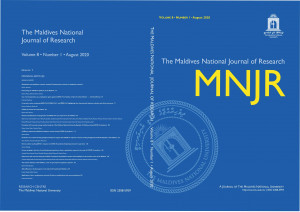Video Recorded Presentations (VRP) and their impact on students’ learning: A mixed method research on blended mode programs at MNU
DOI:
https://doi.org/10.62338/4atsgx38Keywords:
blended learning, distance learner, video recorded presentations, presentation skills, self-confidence, self-evaluationAbstract
Accommodating technology and flexibility in distance education have been part of higher education in the last decade at several higher education institutions of the Maldives. Blending technology in teaching and learning has increased higher education opportunities across the Maldives. This study was conducted to explore the impact of Video Recorded Presentations (VRP) on students’ learning when used as an assessment tool for blended learning students of the Maldives National University(MNU). Adopting a mixed method approach, the study was conducted among students involved in blended learning, who had submitted assessments using VRP. Lecturers from MNU who assessed the VRP contributed to the study by adding their observation on students’ learning from the videos. The students were chosen among learners who submitted assessments using VRP from July 2017 to the end of 2018. Both groups, students and lecturers, expressed that the use of VRP as an assessment tool increased student’s confidence in their presentation skills and provided the opportunity to self-evaluate and submit the best performances. Although there were challenges in VRP recording and submission, students and lecturers found it as a convenient alternative method for in-class presentations that allow useful learning opportunities for blended learners.
References
Christianson, M., Hoskins, C., & Watanabe, A. (n.d). Evaluating the effectiveness of a Video-Recording based self- assessment system for academic speaking. Retrieved November 24, 2020, from https://core.ac.uk/download/pdf/234717241.pdf
Creswell, J. W. (2009). Research Design: Qualitative, Quantitative, and Mixed Methods Approaches. Sage.
Dangwal, K.L. & Lalima. (2017). Blended learning: an innovative approach. Retrieved 14th March from https://eric.ed.gov/?
q=Blended+Learning&ft=on&id=EJ1124666
Problems when making a video. (2015, June 9). Like an Egg Productions Makes Films for Business and Communities. https://www.likeanegg.com/blog-articles/5-problems-when-making-a-video/
Hilliard, A. T. (2015). Global blended learning practices for teaching and learning, leadership and professional development. Retrieved on March 19, 2020 from http://www.cluteinstitute.com
Khodabandehlou, M. (2017). Effect of PowerPoint enhanced teaching (Visual Input) on Iranian Intermediate EFL Learners’ Listening Comprehension Ability.
Riychie, S. M. (2016). Self-assessment of Video-recorded presentations: Does it improve skills? Retrieved on March 26, 2020 from https://doi.org/10.1177/1469787416654807
Trochim, M. (2020). Research methods knowledge base. Retrieved November 28, 2020, from https://conjointly.com/kb/
Vaughan, N. (2014). Student engagement and blended learning: Making the assessment connection. Retrieved on March 13, 2020 from, https://eric.ed.gov/?q=Blended+Learning+in+Higher+Education&ft=on
Wheeler, S. (2017). Bridging behaviorism & cognitivism: Bandura’s 4 principles of social learning. Retrieved on March 13, 2020 from, https://www.teachthought.com/learning/principles-of-social-learning-theory/



